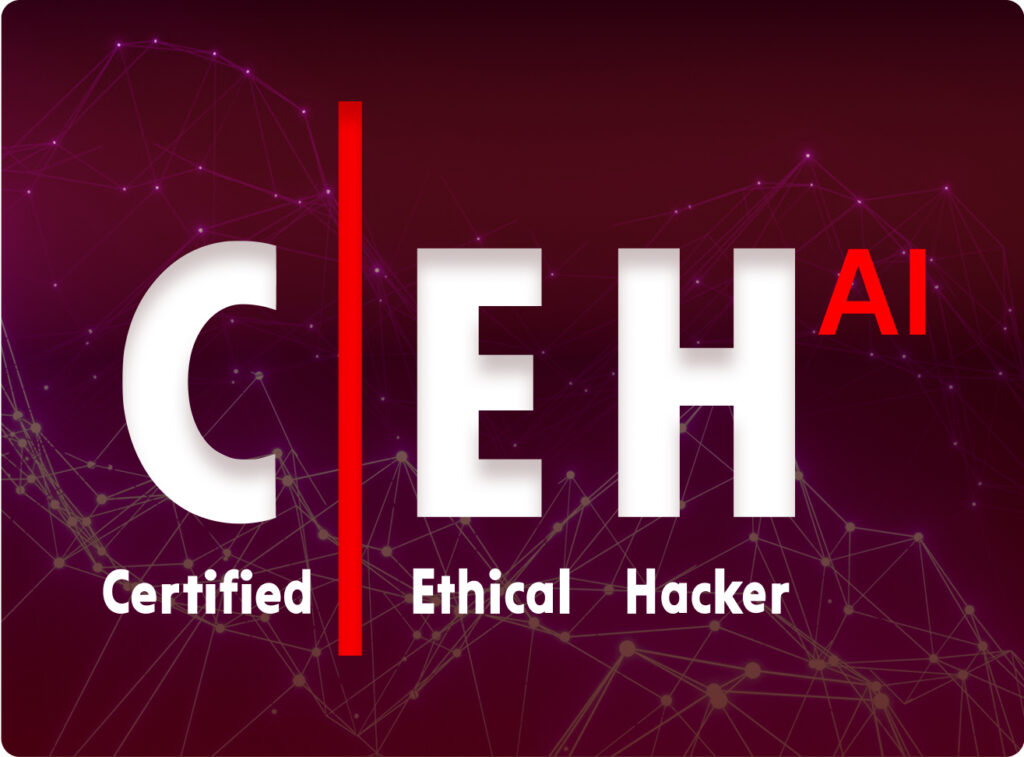Certified Incident Handler (E|CIH)
- 01 September 2025
- Duration 5 days
- 01 June 2026
- Duration: 36 weeks
Master the Art of Incident Handling and Response
The E|CIH program is a comprehensive, method-driven, and lab-intensive certification that trains you to effectively detect, contain, and recover from cybersecurity incidents.

Key Features & Benefits
Globally recognized, ANAB-accredited certification
Approved by US DoD 8140 / 8570
100% compliance to NICE 2.0 Framework and with CREST CCIM
Based on rigorous Job Task Analysis (JTA)
Practical skills development for real-world incident response
95+ hands-on labs, 800+ incident handling & forensic tools, real-world scenarios in simulated environments
Course Outline
Select a module to explore detailed content:
Module 01
Introduction to Incident Handling & Response
Introduction to Incident Handling & Response
- Understand Information Security Threats and Attack Vectors
- Explain Various Attack and Defense Frameworks
- Understand Information Security Concepts
- Understand Information Security Incidents
- Understand the Incident Management Process
- Understand Incident Response Automation and Orchestration
- Describe Various Incident Handling and Response Best Practices
- Explain Various Standards Related to Incident Handling and Response
- Explain Various Cyber Security Frameworks
- Understand Incident Handling Laws and Legal Compliance
Module 02
Incident Handling & Response Process
Incident Handling & Response Process
- Understand Incident Handling and Response (IH&R) Process
- Explain Preparation Steps for Incident Handling and Response
- Understand Incident Recording and Assignment
- Understand Incident Triage
- Explain the Process of Notification
- Understand the Process of Containment
- Describe Evidence Gathering and Forensics Analysis
- Explain the Process of Eradication
- Understand the Process of Recovery
- Describe Various Post-Incident Activities
- Explain the Importance of Information Sharing Activities
Module 03
First Response
First Response
- Explain the Concept of First Response
- Understand the Process of Securing and Documenting the Crime Scene
- Understand the Process of Collecting Evidence at the Crime Scene
- Explain the Process for Preserving, Packaging, and Transporting Evidence
Module 04
Handling and Responding to Malware Incidents
Handling and Responding to Malware Incidents
- Understand the Handling of Malware Incidents
- Explain Preparation for Handling Malware Incidents
- Understand Detection of Malware Incidents
- Explain Containment of Malware Incidents
- Describe How to Perform Malware Analysis
- Understand Eradication of Malware Incidents
- Explain Recovery after Malware Incidents
- Understand the Handling of Malware Incidents – Case Study
- Describe Best Practices against Malware Incidents
Module 05
Handling and Responding to Email Security Incidents
Handling and Responding to Email Security Incidents
- Understand Email Security Incidents
- Explain Preparation Steps for Handling Email Security Incidents
- Understand Detection and Containment of Email Security Incidents
- Understand Analysis of Email Security Incidents
- Explain Eradication of Email Security Incidents
- Understand the Process of Recovery after Email Security Incidents
- Understand the Handling of Email Security Incidents – Case Study
- Explain Best Practices against Email Security Incidents
Module 06
Handling and Responding to Network Security Incidents
Handling and Responding to Network Security Incidents
- Understand the Handling of Network Security Incidents
- Prepare to Handle Network Security Incidents
- Understand Detection and Validation of Network Security Incidents
- Understand the Handling of Unauthorized Access Incidents
- Understand the Handling of Inappropriate Usage Incidents
- Understand the Handling of Denial-of-Service Incidents
- Understand the Handling of Wireless Network Security Incidents
- Understand the Handling of Network Security Incidents – Case Study
- Describe Best Practices against Network Security Incidents
Module 07
Handling and Responding to Web Application Security Incidents
Handling and Responding to Web Application Security Incidents
- Understand the Handling of Web Application Incidents
- Explain Preparation for Handling Web Application Security Incidents
- Understand Detection and Containment of Web Application Security Incidents
- Explain Analysis of Web Application Security Incidents
- Understand Eradication of Web Application Security Incidents
- Explain Recovery after Web Application Security Incidents
- Understand the Handling of Web Application Security Incidents – Case Study
- Describe Best Practices for Securing Web Applications
Module 08
Handling and Responding to Cloud Security Incidents
Handling and Responding to Cloud Security Incidents
- Understand the Handling of Cloud Security Incidents
- Explain Various Steps Involved in Handling Cloud Security Incidents
- Understand How to Handle Azure Security Incidents
- Understand How to Handle AWS Security Incidents
- Understand How to Handle Google Cloud Security Incidents
- Understand the Handling of Cloud Security Incidents – Case Study
- Explain Best Practices against Cloud Security Incidents
Module 09
Handling and Responding to Insider Threats
Handling and Responding to Insider Threats
- Understand the Handling of Insider Threats
- Explain Preparation Steps for Handling Insider Threats
- Understand Detection and Containment of Insider Threats
- Explain Analysis of Insider Threats
- Understand Eradication of Insider Threats
- Understand the Process of Recovery after Insider Attacks
- Understand the Handling of Insider Threats – Case Study
- Describe Best Practices against Insider Threats
Module 10
Handling and Responding to Endpoint Security Incidents
Handling and Responding to Endpoint Security Incidents
- Understand the Handling of Endpoint Security Incidents
- Explain the Handling of Mobile-based Security Incidents
- Explain the Handling of IoT-based Security Incidents
- Explain the Handling of OT-based Security Incidents
- Understand the Handling of Endpoint Security Incidents – Case Study
Our Partners & Vendors







Ready to grow your cybersecurity team?
Training Prerequisites
Core Knowledge
Basic understanding of computer networks and protocols.
Familiarity with fundamental cybersecurity concepts (threats, vulnerabilities, risk management).
Technical Skills
Knowledge of IP addressing, routing, and the TCP/IP stack (IPv4, DNS, DHCP, ARP, ICMP).
Ability to use basic network tools (e.g., ping, traceroute, nslookup, netstat, telnet, curl, http).
Understanding of common attack types (malware, phishing, denial of service).
OS & Tools
Comfortable using Linux or macOS (or Windows Subsystem for Linux).
Ability to install packages and use command-line tools.
Understanding of basic file systems, permissions, and user management.

Training & Register Details
TRAINING OVERVIEW

Certified Incident Handler (E|CIH)
Gain the ultimate skills to identify, contain and minimize cyber incidence

Training Duration: 3 days (24 hours)

Format: Instructor-Led Online

Level: Intermediate

Language: Ukrainian

Materials: English | 12 months valid

Labs: 24/7 180 days access

Exam Attempts: 1 offline
HOW TO REGISTER

1. Submit Your Application
Basic understanding of computer networks and protocols.
2. Intro Call
We’ll schedule a short call to learn more about your goals and expectations.
3. Confirm Your Spot
Get accepted and complete the paperwork. We’ll send you all the info you need.
4. Start Learning
Access your learning platform and get familiar with the materials.
5. Join the Community
Get access to the student chat, events, and mentorship opportunities.
Who is E|CIH for?
Cybersecurity Analysts
Build advanced incident handling skills to respond effectively to modern cyber threats.
SOC Teams & Businesses
Strengthen your organization’s defense with structured incident response strategies and best practices.
Government & Defense
Trusted by agencies and defense sectors worldwide for professional incident handling and compliance readiness.
Educators & Trainers
Incorporate globally recognized incident response training into academic or corporate cybersecurity programs.
FAQ
Is the E|CIH certification worth it?
Yes. The E|CIH is a specialist-level, lab-intensive certification that equips professionals with practical skills to effectively manage and respond to cyber incidents. The program includes 95+ labs and exposure to 800+ tools, ensuring hands-on experience with real-world scenarios.
How do I become a Certified Incident Handler (E|CIH)?
To earn the certification, candidates must complete official training (iLearn, iWeek, or in-person at an Accredited Training Center) and then pass the E|CIH certification exam.
What job roles can I apply for after completing E|CIH?
E|CIH is mapped to the U.S. DoD Cyber Workforce Framework (DCWF) and recognized across multiple job roles, including:
- Cyber Defense Incident Responder
- Cyber Defense Analyst
- Forensic Analyst
- Vulnerability Assessment Analyst
- SOC Specialist
What are the exam details?
- Exam Title: EC-Council Certified Incident Handler (E|CIH)
- Format: Multiple Choice
- Number of Questions: 100
- Duration: 3 Hours
- Availability: ECC Exam Portal
Who should take this course?
The course is intended for cybersecurity professionals involved in incident handling and response, including SOC team members, incident responders, security consultants, auditors, and network administrators.
What is incident response training? Why is it important?
Professionals and organizations should undergo incident response training to respond effectively to cybersecurity incidents, a structured program that prepares professionals with skills to address such events. It is beneficial for Cybersecurity professionals to undergo Incident Response Training. This program equips them with the skills needed to effectively detect, analyze, contain, eradicate, and recover from security incidents, minimizing damage and disruption.
Skills learned in incident response training include incident detection, analysis, containment, remediation, and recovery. Incident response training also covers communication strategies, legal considerations, and post-incident documentation. This training covers critical response competencies like swift communications, legal reviews, and detailed documentation. Its goal is to ensure organizations can quickly coordinate and execute an appropriate response when breaches inevitably occur.
Incident response training happens online and offline with instructors and recorded self-paced videos. EC-Council’s incident handler training provides such training options. ECIH’s incident response training is the handbook for incident handlers.
Is the E|CIH a hands-on program?
Yes, the E|CIH is a hands-on program with fifty percent of the class time dedicated to labs. Students gain real-time experience handling IH&R scenarios by leveraging the latest tools, techniques, methodologies, and frameworks.
What does an E|CIH do?
An E|CIH candidate is responsible for handling post-breach consequences. They apply various incident handling and response standards and best practices to reduce the financial and reputational damage organizations endure after a cyber attack incident.

